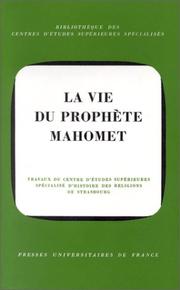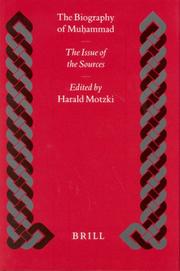| Listing 1 - 6 of 6 |
Sort by
|
Book
ISBN: 2213603286 9782213632834 2213632839 9782213603285 9782213637204 Year: 2007 Publisher: Paris: Hachette,
Abstract | Keywords | Export | Availability | Bookmark
 Loading...
Loading...Choose an application
- Reference Manager
- EndNote
- RefWorks (Direct export to RefWorks)
Muḥammad, --- 297.167 --- 297.167 Islam: stichter: Mohammed --- Islam: stichter: Mohammed

ISBN: 2130374948 Year: 1983 Publisher: Paris Presses Universitaires de France
Abstract | Keywords | Export | Availability | Bookmark
 Loading...
Loading...Choose an application
- Reference Manager
- EndNote
- RefWorks (Direct export to RefWorks)
297.167 --- Muslims --- -Mohammedans --- Moors (People) --- Moslems --- Muhammadans --- Musalmans --- Mussalmans --- Mussulmans --- Mussulmen --- Religious adherents --- Islam --- Islam: stichter: Mohammed --- Biography --- -History and criticism --- Muhammad Prophet --- -Biography --- -Islam: stichter: Mohammed --- 297.167 Islam: stichter: Mohammed --- -297.167 Islam: stichter: Mohammed --- Mohammedans --- Muḥammad, --- Mahomed, --- Maḥmūd, --- Mahomet, --- Mohammed, --- Magomet, --- Mu-han-mo-te, --- Nabi Muhammad, --- Mukhammed, --- Maometto, --- Mahometto, --- Mohammad, --- Mahoma, --- Muḥamad, --- מוחמד --- מוחמד, --- ، محمد --- النبي محمد --- محمد --- محمد الرسول --- محمد النبي --- محمد، نبي --- محمد، پيامبر --- محمد، --- محمدو --- محمد, --- محمد. --- ممحمد، --- History and criticism. --- محمد الرسول, --- محمد النبي,

ISSN: 09292403 ISBN: 9004115137 9004452907 9789004115132 9789004452909 Year: 2000 Volume: v. 32 Publisher: Leiden; Boston : BRILL,
Abstract | Keywords | Export | Availability | Bookmark
 Loading...
Loading...Choose an application
- Reference Manager
- EndNote
- RefWorks (Direct export to RefWorks)
This book deals with the controversial value of the sources on which the biography of Muhammad, the founder of Islam, is based. Discussions on this topic have been going on for more than a century but it has become especially debated during the last two decades. This volume contains ten articles which are the outcome of an international colloquium on the issue. Part one of the book examines the development of the Muslim tradition concerning the life of Muhammad while the other part focuses on the historical reliability of the source material. The volume reflects not only the most recent methodological developments in the study of the life of Muhammad but also the improvement of its material-basis due to sources which have only recently become available or which have been neglected.
Mu*hammad, --- Muḥammad, --- Muhammad, --- 297.167 --- Islam: stichter: Mohammed --- Muhammad Prophet --- 297.167 Islam: stichter: Mohammed --- Mahomed, --- Maḥmūd, --- Mahomet, --- Mohammed, --- Magomet, --- Mu-han-mo-te, --- Nabi Muhammad, --- Mukhammed, --- Maometto, --- Mahometto, --- Mohammad, --- Mahoma, --- Muḥamad, --- מוחמד --- מוחמד, --- ، محمد --- النبي محمد --- محمد --- محمد الرسول --- محمد النبي --- محمد، نبي --- محمد، پيامبر --- محمد، --- محمدو --- محمد, --- محمد. --- ممحمد، --- محمد الرسول, --- محمد النبي, --- Muḥammad, - Prophet, - -632 - Biography --- Muhammad, - Prophet, - -632 - Biography - Sources --- Islam --- History --- History. --- Muḥammad, - Prophet, - -632 --- Muhammad, - Prophet, - -632
Book
ISBN: 9780415567176 9780203850060 0203850068 0415567173 9781138788862 1136959742 1283044641 9786613044648 9781136959691 9781136959738 9781136959745 Year: 2011 Publisher: London : Routledge,
Abstract | Keywords | Export | Availability | Bookmark
 Loading...
Loading...Choose an application
- Reference Manager
- EndNote
- RefWorks (Direct export to RefWorks)
This book considers the Arabic biographies of Prophet Muhammad, the earliest of which dates from two centuries after his life. These biographies, prized by Muslims, have been approached in the Western study of Islam from a range of positions. Some scholars reject them entirely, seeing in them products of the Muslim community's idealisation of its history, while others accept them at face value, reasoning that, if not exact versions of events, the events could not have differed too much from their descriptions. The author revisits the debate and reconsiders several key incidents in the life of the Prophet. By compiling an extensive corpus of materials and comparing them closely, this book analyses the transmission and the contents of the accounts. It shows that by understanding clearly the interaction in early Islam between written and oral modes of transmission, and by the judicious sieving of the accounts, as well as the lines of transmission, we can sometimes reach back to that generation of Muslims who though not themselves witness to the events were younger contemporaries of those who were. Establishing a solid basis for the informed study of Muhammad's biography and adding to the ongoing debate, this book will appeal to scholars of early Islam, history and theology.--provided by publisher.
Muḥammad, --- Biography --- History and criticism. --- Mahomed, --- Maḥmūd, --- Mahomet, --- Mohammed, --- Magomet, --- Mu-han-mo-te, --- Nabi Muhammad, --- Mukhammed, --- Maometto, --- Mahometto, --- Mohammad, --- Mahoma, --- Muḥamad, --- מוחמד --- מוחמד, --- ، محمد --- النبي محمد --- محمد --- محمد الرسول --- محمد النبي --- محمد، نبي --- محمد، پيامبر --- محمد، --- محمدو --- محمد, --- محمد. --- ممحمد، --- 297.167 --- 297.167 Islam: stichter: Mohammed --- Islam: stichter: Mohammed --- Prophets --- محمد الرسول, --- محمد النبي, --- Mahomet (prophète de l'Islam ; 057.-0632) --- Biographies --- Sources --- Critique et interprétation
Book
ISBN: 9780691167060 0691167060 0691186111 0691270988 Year: 2019 Publisher: Princeton Princeton University Press
Abstract | Keywords | Export | Availability | Bookmark
 Loading...
Loading...Choose an application
- Reference Manager
- EndNote
- RefWorks (Direct export to RefWorks)
Heretic and impostor or reformer and statesman? The contradictory Western visions of Muhammad0In European culture, Muhammad has been vilified as a heretic, an impostor, and a pagan idol. But these aren't the only images of the Prophet of Islam that emerge from Western history. Commentators have also portrayed Muhammad as a visionary reformer and an inspirational leader, statesman, and lawgiver. In Faces of Muhammad, John Tolan provides a comprehensive history of these changing, complex, and contradictory visions. Starting from the earliest calls to the faithful to join the Crusades against the "Saracens," he traces the evolution of Western conceptions of Muhammad through the Reformation, the Enlightenment, and the nineteenth and twentieth centuries, and up to the present day. Faces of Muhammad reveals a lengthy tradition of positive portrayals of Muhammad that many will find surprising. To Reformation polemicists, the spread of Islam attested to the corruption of the established Church, and prompted them to depict Muhammad as a champion of reform. In revolutionary England, writers on both sides of the conflict drew parallels between Muhammad and Oliver Cromwell, asking whether the prophet was a rebel against legitimate authority or the bringer of a new and just order. Voltaire first saw Muhammad as an archetypal religious fanatic but later claimed him as an enemy of superstition. To Napoleon, he was simply a role model: a brilliant general, orator, and leader. The book shows that Muhammad wears so many faces in the West because he has always acted as a mirror for its writers, their portrayals revealing more about their own concerns than the historical realities of the founder of Islam.
Islam --- History of Europe --- Muhammad --- 297*35 --- 297.167 --- 297.167 Islam: stichter: Mohammed --- Islam: stichter: Mohammed --- 297*35 Islam en het Westen --- Islam en het Westen --- Mohammedanism --- Muhammadanism --- Muslimism --- Mussulmanism --- Religions --- Muslims --- Public opinion --- Muḥammad, --- Mahomed, --- Maḥmūd, --- Mahomet, --- Mohammed, --- Magomet, --- Mu-han-mo-te, --- Nabi Muhammad, --- Mukhammed, --- Maometto, --- Mahometto, --- Mohammad, --- Mahoma, --- Muḥamad, --- מוחמד --- מוחמד, --- ، محمد --- النبي محمد --- محمد --- محمد الرسول --- محمد النبي --- محمد، نبي --- محمد، پيامبر --- محمد، --- محمدو --- محمد, --- محمد. --- ممحمد، --- Public opinion. --- Islamic countries --- Europe --- Relations --- محمد الرسول, --- محمد النبي, --- Muḥammad --- Appréciation --- Cristianisme i altres religions --- Islamisme --- Apreciació --- Interpretacions cristianes --- Europe. --- Islamic countries. --- Western countries. --- Westliche Welt --- Westliche Staaten --- Westen --- Der Westen --- Kapitalistische Staaten --- Industriestaaten --- Westmächte --- Nichtwestliche Welt --- Occident --- Western countries --- Western nations --- Western world --- Developed countries --- Muslim countries --- Council of Europe countries --- Eastern Hemisphere --- Eurasia
Book
ISBN: 9780812250404 0812250400 0812295250 Year: 2018 Publisher: Philadelphia: University of Pennsylvania press,
Abstract | Keywords | Export | Availability | Bookmark
 Loading...
Loading...Choose an application
- Reference Manager
- EndNote
- RefWorks (Direct export to RefWorks)
In The Apocalypse of Empire, Stephen J. Shoemaker argues that earliest Islam was a movement driven by urgent eschatological belief that focused on the conquest, or liberation, of the biblical Holy Land and situates this belief within a broader cultural environment of apocalyptic anticipation. Shoemaker looks to the Qur'an's fervent representation of the imminent end of the world and the importance Muhammad and his earliest followers placed on imperial expansion. Offering important contemporary context for the imperial eschatology that seems to have fueled the rise of Islam, he surveys the political eschatologies of early Byzantine Christianity, Judaism, and Sasanian Zoroastrianism at the advent of Islam and argues that they often relate imperial ambition to beliefs about the end of the world. Moreover, he contends, formative Islam's embrace of this broader religious trend of Mediterranean late antiquity provides invaluable evidence for understanding the beginnings of the religion at a time when sources are generally scarce and often highly problematic.Scholarship on apocalyptic literature in early Judaism and Christianity frequently maintains that the genre is decidedly anti-imperial in its very nature. While it may be that early Jewish apocalyptic literature frequently displays this tendency, Shoemaker demonstrates that this quality is not characteristic of apocalypticism at all times and in all places. In the late antique Mediterranean as in the European Middle Ages, apocalypticism was regularly associated with ideas of imperial expansion and triumph, which expected the culmination of history to arrive through the universal dominion of a divinely chosen world empire. This imperial apocalypticism not only affords an invaluable backdrop for understanding the rise of Islam but also reveals an important transition within the history of Western doctrine during late antiquity.
Eschatology in literature --- Apocalyptic literature --- Islamic eschatology in literature --- Islamic eschatology. --- Eschatology --- Eschatology, Greco-Roman. --- Eschatology in rabbinical literature --- Eschatology, Jewish. --- Imperialism --- History and criticism. --- History of doctrines --- Religious aspects --- Islam. --- Christianity. --- Judaism. --- Islamic eschatology --- Eschatology, Greco-Roman --- Eschatology, Jewish --- Colonialism --- Empires --- Expansion (United States politics) --- Neocolonialism --- Political science --- Anti-imperialist movements --- Caesarism --- Chauvinism and jingoism --- Militarism --- Rabbinical literature --- Greco-Roman eschatology --- Eschatology, Islamic --- Muslim eschatology --- Eschatology, Islamic, in literature --- History and criticism --- Islam --- Christianity --- Judaism --- 297.116*1 --- 297.167 --- 297.167 Islam: stichter: Mohammed --- Islam: stichter: Mohammed --- 297.116*1 Relatie Islam tot Christendom --- Relatie Islam tot Christendom --- Eschatologie. --- Littérature apocalyptique. --- Eschatologie --- Impérialisme --- Dans la littérature. --- Judaïsme --- Religion grecque. --- Aspect religieux --- Christianisme. --- Judaïsme. --- Eschatology in literature - History and criticism. --- Apocalyptic literature - History and criticism. --- Islamic eschatology in literature - History and criticism. --- Eschatology - History of doctrines - Early church, ca. 30-600. --- Eschatology in rabbinical literature - History and criticism. --- Imperialism - Religious aspects - Islam. --- Imperialism - Religious aspects - Christianity. --- Imperialism - Religious aspects - Judaism. --- Ancient Studies. --- History. --- Medieval and Renaissance Studies. --- Religion. --- Religious Studies.
| Listing 1 - 6 of 6 |
Sort by
|

 Search
Search Feedback
Feedback About UniCat
About UniCat  Help
Help News
News